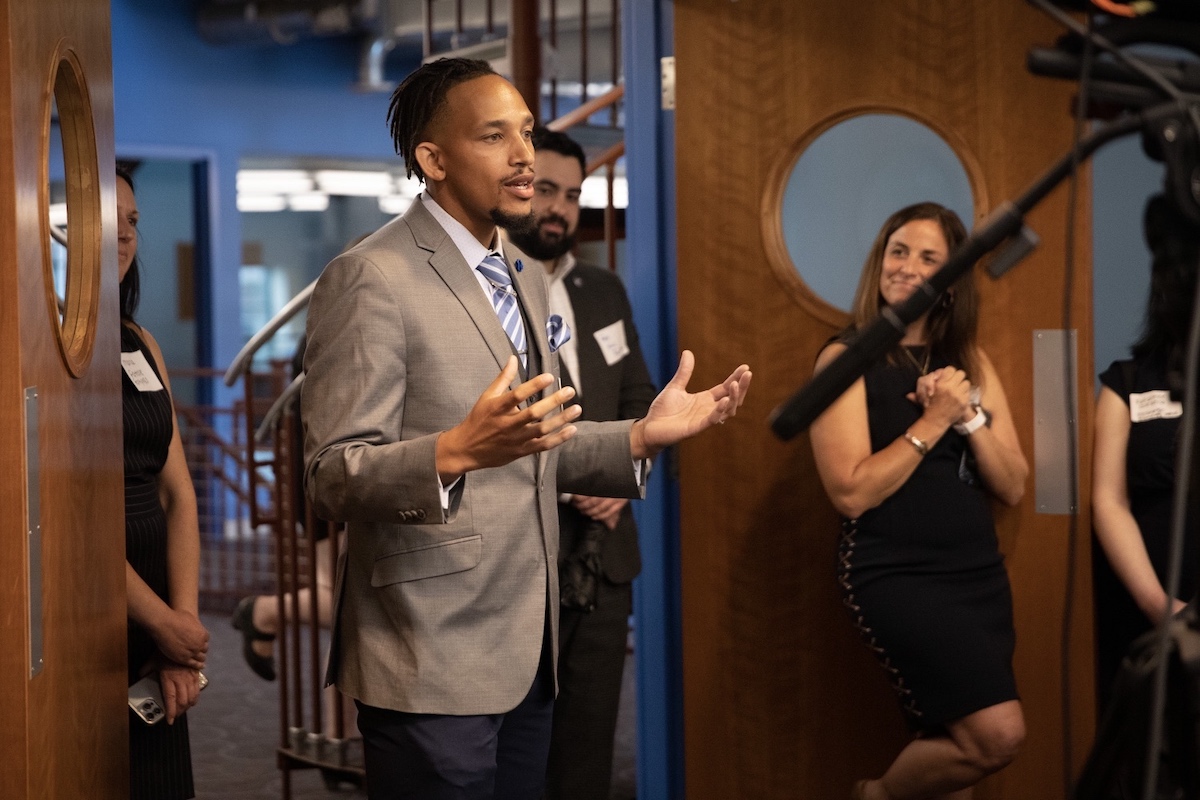From agriculture to construction, apprenticeships have long been seen for as a way for motivated — but not always “traditional” — candidates to earn the skills they need to enter a field with a talent shortage. In the 21st century, tech is increasingly an industry where candidates can find hands-on learning and promising, high-pay prospects through apprenticeships, too.
Pennsylvania Lt. Gov. Austin Davis and Industry Acting Secretary Nancy Walker ventured to Station Square on Friday to hear from employees of video game development company Schell Games, members of the Pittsburgh Technology Council and apprenticeship program graduates to learn about why apprenticeships matter to the community, and what makes them successful.
The conversation came amid Pittsburgh tech leaders’ ongoing call for workers to fill the tech hub’s thousands of open jobs, as well as a budget proposal from Gov. Josh Shapiro suggesting a $23.8 million increase to bridge the gap between career and technical education programs and hiring industries.
Jesse Schell, the CEO of Schell Games, noted the company had been asked to host the day’s forum because it recently launched its own apprenticeship program in tandem with Community College of Allegheny County. He’d long been considering whether “the normal path of education” — high school, then college, then career — was necessary for those seeking to enter the game development industry. The new program combines 20 hours of classroom time and 20 hours of on-the-job training per week, with Schell Games covering tuition and transportation costs for select apprentices. After three years, participants will earn an associate’s degree in multimedia programming, simulation and gaming.

Davis, a Mon Valley native, stressed the benefit of workforce development programs for people who grew up in neighborhoods like his. He said he feels reassured that, based on his experience so far in Harrisburg, apprenticeships tend to receive increasingly elusive bipartisan support. He also called for continued investment in workforce development programs and apprenticeships.
“If we’re going to address Pennsylvania’s workforce development issues, we need to create pipelines of talent in key industries like tech, and we need to empower young people to pursue their dreams, no matter what they may be,” the lieutenant governor said. “That’s why the Shapiro-Davis budget invests more into apprenticeship programs and brings career and technical training back into the classroom.”
In the case of the Apprenti PGH, a tech-focused apprenticeship program hosted by the Pittsburgh Tech Council, Audrey Russo, the organization’s president, said that what mattered most was establishing trust and forging relationships within the communities in which they’re trying to find program participants.

Some people have been hesitant to believe that Apprenti PGH would actually offer things like transportation to bootcamps and childcare, and provide essential technology to apprentices, she said. But once program leaders made connections with residents of the communities where they were doing outreach, such as the Hill District, it became easier to convince would-be participants that Apprenti would follow through on what it was promising.
“It’s the relationships that we’ve amassed over the years and the amazing people who care about this and hold us accountable, making sure to understand I’m not just this Caucasian woman walking in the room, saying, ‘I’m just here to help,'” Russo said. “We’ve had these … conversations about, ‘What does it mean to be authentic? How do you have relationships with people like you inside the company?’ It’s not just about dumping people into an environment and thinking that it really can thrive.”
Russo added that the Pittsburgh Tech Council connects apprentices to the organization’s wider network, so they’re less likely to feel isolated while embarking on a new career path.

Fortyx80 Assistant Director of Talent Development and Apprenticeships Tarelle Irwin, who helped Apprenti PGH launch a cybersecurity apprenticeship program this year, recalled that when he worked as a sales rep and a commercial driver for Pepsi, he was eager to elevate his career. Yet, while delivering beverages in his truck, he wasn’t sure how to make this happen — until an injury cut his driving days short, and changed his desire for a career change into a need. Irwin now works to provide the same opportunities that someone such as himself could’ve benefited from.
“There were opportunities,” Irwin said. “I just didn’t know anything about them. … Many more people are out there that are trying and don’t have someone out there to connect to, to just say, ‘Hey, this is all you have to do is make this small pivot and you can change the whole trajectory of your family and generations to come.'”
The roundtable discussion also included executive and HR representatives from 412 Food Rescue, AbiliLife, Astrobotic, BNY Mellon, CGI, CNX, Eden Hall Foundation, enGen, EQT, FedEx, Matthews International, Partner4work, PGT Trucking, PNC, Richard King Mellon Foundation, Sheetz, University of Pittsburgh and Wolfe.







